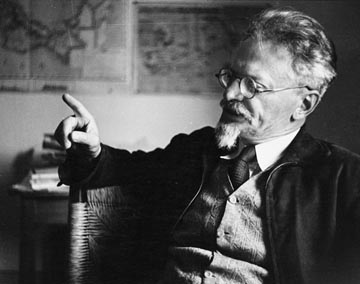 Marxists believe that conditions determine consciousness. The ideas that most people have are products of their circumstances. Currently workers sell their labour power as a commodity. That is why they concentrate efforts on the price of their labour power (wages) and the terms and conditions at which it is sold.
Marxists believe that conditions determine consciousness. The ideas that most people have are products of their circumstances. Currently workers sell their labour power as a commodity. That is why they concentrate efforts on the price of their labour power (wages) and the terms and conditions at which it is sold.
It is why they value those services that they cannot provide for themselves individually but are unable to provide collectively because they lack the consciousness and organisation to do so. This includes such things as unemployment insurance, pensions, health care and education.
The sanctification of capitalist private property means that the former is not strictly political while the distribution of the revenue from capitalism is. Through the latter the working class is made dependent on the state for these services, including through employment in their delivery. The welfare dependency culture repeated like a mantra by the right has this much basis in fact.
What there is not therefore is the material basis for the growth of a consciousness that workers should own, manage and control the productive activities of the economy and the state. Instead the growth of the state and its acknowledged political leadership are the grounds for the view that the redistributive powers of the state are the basis for a solution. This mistaken view takes the extreme form on the Left that the state should take over production itself. Of course this has been tried. It didn’t work well.
What we have with the Keynesian alternative then is an expectation, doomed to disappointment, that the capitalist state will divide the fruits of capitalism to benefit those who have first been exploited in opposition to those who have carried out the exploitation, which must remain in place in order to continue funding the redistribution.
Marxists believe that the future socialist society is not utopian because current society contains its anticipation in various ways. Capitalism is pregnant with the future socialism; except that if the state is the embryo then the pregnancy taken to full term does not result in socialism but something else entirely.
Workers’ cooperatives are one of the crucial elements of this anticipated new society growing within the womb of the old. It reunites workers with the means of production and removes the capitalist from the workplace. It gives ownership to the workers and elevates their power, confidence and consciousness. It can prepare the workers involved and other workers for the task of making the whole economy the property of the working class, which is socialism.
Workers ownership can provide the basis for workers to provide the services that are currently provided by the state and which leaves them at the mercy of the state and the politicians who preside on top of it. Such services include education, health, welfare and pensions. Workers self-provision of this would result in their own priorities being imposed on their provision.
However to posit this as the alternative immediately demonstrates a major difficulty. While it is possible to envisage workers cooperatives supplanting individual capitalist production it is much more difficult to envisage this in regard to the services now provided by the State. What this once again demonstrates is the role of the state as defender of the capitalist system – through exclusion of the working class from direct control within society and protection of the accumulation needs of capitalism.
Workers’ self-provision of what are now services provided by the state would necessarily lead not to demanding more taxation by the state but less, so that workers would have more control of their earnings and would have more to pool together and employ to their collective benefit. In short workers would take more and more responsibility for their own lives, even when temporarily or permanently unable to work. The dependence on the capitalist state would be weakened, at least in this respect.
In Ireland workers would have the grounds for recognising that there is an alternative economic development model to reliance on US multinationals. They would have an example of a model of development that didn’t rely on the state. They would have a living alternative to the threats that they need the capitalist banks.
Instead of workers relying on the state to provide for them by taxing the rich or investing in infrastructure to promote private capitalist investment they would have an alternative in which it is their own activity which is the alternative to capitalist crisis.
Is this the viewpoint of a reformist and utopian scenario? I think not.
Firstly thousands of cooperatives already exist; they are not purely idealistic mental constructions. What’s more they can be, and many are, very successful; providing hundreds of thousands of jobs. Living proof that workers can do without capitalists to tell them what to do. Workers can take control, can make decisions and can be successful.
The spread of workers’ cooperatives in entirely possible, their growth and development is not precluded by any necessarily limiting factor in capitalist development, at least to the point where capitalist accumulation appears threatened by it.
The trade union movement and the political organisations of the working class can play an important role in their development. Workers’ cooperatives are therefore not an alternative to the existing workers movement but are something that can be complementary to its development, freeing it more and more from dependence on private capital and the state.
In fact workers’ cooperatives will inevitably demonstrate through their development the antipathy of the state to workers ownership and the power that workers as a class will develop as a result of its development. The state will inevitably be used by the class it serves, the capitalist class, to undermine competition from workers cooperatives and support private capitalist accumulation. Such a development will clarify the lines of battle between the workers’ movement and the capitalist system.
Workers’ cooperatives are not an alternative to class struggle but a means of carrying it out. The creation of workers’ cooperatives in Argentina following its capitalist crises is evidence of this – how much better to promote workers’ cooperatives before such cataclysmic crises rather than in their midst or aftermath.
When workers say – “where is your socialist alternative after over a 150 years of your movement?”, we might have a living movement to point to rather than a simple promise for the future.
And such a movement will be an international one because just as capitalist development has become international there is every reason why workers’ cooperative production should also be international. Every bit of such development will strengthen the international bonds between workers and undermine nationalist solutions that are currently growing.
In other words workers’ cooperatives provide the living link between resistance against the injustice of the current system and the creation of a real alternative. Instead of simple rejection of cuts and lack of democracy workers’ cooperatives not only posit employment and democracy within the cooperative but the transition to a new society. Workers’ cooperatives thus provide the material basis for linking the struggle against capitalism to the creation of socialism.
Workers’ cooperatives are not a magic bullet answer to the current crisis on the Left. There is no simple or singular programmatic answer to a crisis that exists at the level of working class consciousness and organisation. But for the Left a programmatic answer is currently by far and away the most important contribution that it can provide to workers.
Traditionally the revolutionary left has rejected workers’ cooperatives because they have been seen as an alternative to revolution – a militant class struggle against capitalists and the state culminating in an insurrection, the smashing of the capitalist state and creation of a new one. I don’t think anyone can credibly claim that the patient work of class organisation involved in union organising, party building and creation of workers’ cooperatives would get in the way of a burgeoning revolutionary movement. Anyway, when was the last revolution in an advanced capitalist state, one in which the working class is the vast majority of society?
It can be legitimately claimed that workers in existing cooperatives lack socialist consciousness so how can they provide the material basis for socialism? This objection however must also take on board the reality that decades of union organisation has also not turned the majority of trade unionists into socialists. However no one advocates abandoning the organisation of trade unions.
Finally an objection is made that workers’ cooperatives will simply teach workers to exploit themselves within a market economy based on competition. They will simply become their own capitalists.
However, at the extreme, the ownership of all production by the working class would not only remove the capitalist class but would also remove the need for all allocation by the market, or by socially necessary labour time, to use the strictly Marxist definition. In other words workers’ cooperatives would cooperate with each other. Such competition as would exist would not play the same role as capitalist competition just as the continued existence of money tokens would not make it a capitalist system.
So for example, a factory making shoes that became unfashionable would not close down and throw its workers into unemployment but would see them transfer to either production of shoes that were in demand or to some entirely different branch of production. Other workers would support this because they would all know that what they produce might equally go out of fashion, become technologically obsolete or have its workforce reduced by automation. In the same way the receipt of money as salaries and wages would not mean that this money would exist as capital, able to purchase labour power in the pursuit of profit.
The current value of workers’ cooperatives is not just as living practical examples of socialism but that they allow theoretical and political clarification of just exactly what socialism is. They shine a light on the difference between workers power and all the solutions that rely on the state – from Keynesianism to nationalism.
This is the second part of the post. The first part appeared here.











